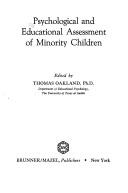| Listing 1 - 10 of 11 | << page >> |
Sort by
|

ISBN: 0876301456 Year: 1977 Publisher: New York (N.Y.): Brunner and Mazel
Abstract | Keywords | Export | Availability | Bookmark
 Loading...
Loading...Choose an application
- Reference Manager
- EndNote
- RefWorks (Direct export to RefWorks)
Bilingualism --- Children of minorities --- Educational tests and measurements --- Psychological tests for children --- Testing --- Psychological testing
Book
ISBN: 9780826157348 Year: 2010 Publisher: New York Springer
Abstract | Keywords | Export | Availability | Bookmark
 Loading...
Loading...Choose an application
- Reference Manager
- EndNote
- RefWorks (Direct export to RefWorks)
Disability evaluation --- People with disabilities --- Functional assessment
Book
ISBN: 1281308994 9786611308995 0080559786 0123735866 9780123735867 9780080559780 Year: 2008 Publisher: Amsterdam Boston Elsevier/Academic Press
Abstract | Keywords | Export | Availability | Bookmark
 Loading...
Loading...Choose an application
- Reference Manager
- EndNote
- RefWorks (Direct export to RefWorks)
This book summarizes information on adaptive behavior and skills as well as general issues in adaptive behavior assessment with the goal of promoting sound assessment practice during uses, interpretations, and applications of the Adaptive Behavior Assessment System-II. Adaptive behavior and skills refer to personal qualities associated with the ability to meet one's personal needs such as communication, self-care, socialization, etc. and those of others. Data from measures of adaptive behavior have been used most commonly in assessment and intervention services for persons with mental
Behavioral assessment. --- Psychological tests. --- Behavioral assessment of children. --- Psychological tests for children. --- Adaptability (Psychology) --- Testing. --- Children --- Psychological testing of children --- Child development --- Child psychology --- Psychodiagnostics --- Mental tests --- Psychological assessment --- Tests, Psychological --- Psychology --- Testing --- Clinical psychology --- Educational tests and measurements --- Assessment of behavior --- Behavior assessment --- Behavioral analysis --- Behavioral evaluation --- Psychological testing --- Methodology
Digital
ISBN: 9780123735867 0123735866 9780080559780 0080559786 Year: 2008 Publisher: Boston Elsevier/Academic Press
Abstract | Keywords | Export | Availability | Bookmark
 Loading...
Loading...Choose an application
- Reference Manager
- EndNote
- RefWorks (Direct export to RefWorks)
This book summarizes information on adaptive behavior and skills as well as general issues in adaptive behavior assessment with the goal of promoting sound assessment practice during uses, interpretations, and applications of the Adaptive Behavior Assessment System-II. Adaptive behavior and skills refer to personal qualities associated with the ability to meet one's personal needs such as communication, self-care, socialization, etc. and those of others. Data from measures of adaptive behavior have been used most commonly in assessment and intervention services for persons with mental retardation. However, the display of adaptive behaviors and skills is relevant to all persons. The Adaptive Behavior Assessment System-II (ABAS-II) provides a comprehensive, norm-referenced assessment of the adaptive behavior and skills of individuals from birth through age 89. The comprehensive natures of the ABAS-II, ease in administration and scoring, and wide age range have resulted in its widespread use for a large number of assessment purposes. The book provides practical information and thus serves as a valuable resource for those who use the ABAS-II. * Assists in the functional use of the ABAS-II * Provides case studies illustrating use of the ABAS-II in comprehensive assessment and intervention planning * Reviews scholarship on adaptive behaviors and skills * Describes legal, ethical, and other professional standards and guidelines that apply to the use of the ABAS-II and other measures of adaptive behavior * Discusses the use of the ABAS-II with autism, mental retardation; young children and those in elementary and secondary school; as well as incarcerated persons being evaluated for possible mental retardation.
Book
ISBN: 0826157343 0826157351 1282328476 9786612328473 Year: 2009 Publisher: New York Springer Publishing Company
Abstract | Keywords | Export | Availability | Bookmark
 Loading...
Loading...Choose an application
- Reference Manager
- EndNote
- RefWorks (Direct export to RefWorks)

ISBN: 1782689427 1452216398 1412976138 9781412976138 9781452216393 9781412926690 1412926696 9781782689423 Year: 2007 Publisher: Thousand Oaks : Sage Publications,
Abstract | Keywords | Export | Availability | Bookmark
 Loading...
Loading...Choose an application
- Reference Manager
- EndNote
- RefWorks (Direct export to RefWorks)
With contributions from authors from more than 40 countries 'The Handbook of International School Psychology' provides a description of the speciality of psychology devoted to the provision of services to children and youth, their teachers, and parents around the world.
School psychology --- Psychology, School --- Psychology, Applied --- School psychology.
Book
ISBN: 9780123741776 0123741777 9786612769054 0080921078 1282769057 9780080921075 9781282769052 Year: 2010 Publisher: Amsterdam Boston
Abstract | Keywords | Export | Availability | Bookmark
 Loading...
Loading...Choose an application
- Reference Manager
- EndNote
- RefWorks (Direct export to RefWorks)
One of the most widely used assessments of infants and toddlers, the BAYLEY-III measures the major areas of development including cognitive, language, motor, social-emotional, and adaptive functioning. This book provides an introduction into use of the BAYLEY-III in each of these five areas. For each of these areas, individual chapters cover the relevant test content, administration, scoring, interpretation, strengths / concerns, and uses in clinical populations. Each chapter also includes a real life case study demonstrating typical performance of a child with delays one of the five areas
Bayley Scales of Infant Development. --- Child Development. --- Child, Preschool. --- Infant. --- Motor Skills. --- Psychological Tests. --- Psychology, Child --- Methods. --- Child development. --- Infant psychology. --- Infants --- Child psychology --- Child study --- Children --- Development, Child --- Developmental biology --- Psychology --- Development
Digital
ISBN: 9780080921075 0080921078 1282769057 9781282769052 Year: 2010 Publisher: Amsterdam ;Boston Academic Press
Abstract | Keywords | Export | Availability | Bookmark
 Loading...
Loading...Choose an application
- Reference Manager
- EndNote
- RefWorks (Direct export to RefWorks)
One of the most widely used assessments of infants and toddlers, the BAYLEY-III measures the major areas of development including cognitive, language, motor, social-emotional, and adaptive functioning. This book provides an introduction into use of the BAYLEY-III in each of these five areas. For each of these areas, individual chapters cover the relevant test content, administration, scoring, interpretation, strengths / concerns, and uses in clinical populations. Each chapter also includes a real life case study demonstrating typical performance of a child with delays one of the five areas of development. The book concludes with a special chapter on procedures for brief neurodevelopmental screening of infants in pediatric settings. Covering all major areas of development, the book is informative for a wide range of professionals who use the BAYLEY-III to evaluate development of infants and toddlers from multiple perspectives including psychology, speech and language, and occupational/physical therapy. Provides an overview of the theoretical background and structure of BAYLEY-III written by the lead Research Director Introduces practitioners to the test content in each of the five major areas of child development covered by the BAYLEY-III: cognitive, language, motor, social-emotional, and adaptive functioning Readers will learn how to competently administer, score, and interpret each of the five scales in the BAYLEY-III Explains the strengths and limitations of the test in each of the five areas it measures Instructs readers on uses of the test in specific clinical populations Includes five case studies showing typical patterns of children delayed in one of the five areas of development Concludes with a special chapter on neurodevelopmental screening procedures in pediatric settings.
Object

Year: 2020 Publisher: Amsterdam Hogrefe
Abstract | Keywords | Export | Availability | Bookmark
 Loading...
Loading...Choose an application
- Reference Manager
- EndNote
- RefWorks (Direct export to RefWorks)
Met de ABAS-3 kan op een valide en betrouwbare manier het adaptieve gedrag van kinderen en volwassenen in kaart gebracht worden. De ABAS-3 meet vaardigheden die belangrijk zijn voor diverse gebieden in het dagelijks leven, zoals communicatie en sociaal contact, vrijetijdsbesteding, het zorgen voor de eigen gezondheid en veiligheid, of het uitvoeren van activiteiten in een thuis- of schoolomgeving.De ABAS-3 kan worden gebruikt als onderdeel van een breder diagnostisch onderzoek naar de adaptieve vaardigheden van kinderen en volwassenen met het oog op het in kaart brengen van sterktes en zwaktes bij indicatiestelling of voor het opstellen van een behandelingsplan op maat.
Object

Year: 2020 Publisher: Amsterdam Hogrefe
Abstract | Keywords | Export | Availability | Bookmark
 Loading...
Loading...Choose an application
- Reference Manager
- EndNote
- RefWorks (Direct export to RefWorks)
Met de ABAS-3 kan op een valide en betrouwbare manier het adaptieve gedrag van kinderen en volwassenen in kaart gebracht worden. De ABAS-3 meet vaardigheden die belangrijk zijn voor diverse gebieden in het dagelijks leven, zoals communicatie en sociaal contact, vrijetijdsbesteding, het zorgen voor de eigen gezondheid en veiligheid, of het uitvoeren van activiteiten in een thuis- of schoolomgeving. De ABAS-3 kan worden gebruikt als onderdeel van een breder diagnostisch onderzoek naar de adaptieve vaardigheden van kinderen en volwassenen met het oog op het in kaart brengen van sterktes en zwaktes bij indicatiestelling of voor het opstellen van een behandelingsplan op maat.
| Listing 1 - 10 of 11 | << page >> |
Sort by
|

 Search
Search Feedback
Feedback About UniCat
About UniCat  Help
Help News
News